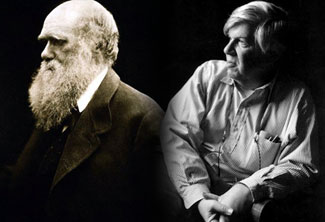Darwinists Squirm Under Spotlight
Source: arn.org
 Charles Darwin & Stephen Jay Gould |
This article is reprinted from an interview with Citizen Magazine, January 1992.
Phillip Johnson has been a law professor at the University of California at Berkeley for more than 20 years. As an academic lawyer, one of Johnson's specialties is "analyzing the logic of arguments and identifying the assumptions that lie behind those arguments." A few years ago he began to suspect that Darwinism, far from being an objective fact, was little more than a philosophical position dressed up as science--and poor science at that. Wanting to see whether his initial impression was correct, Johnson decided to take a closer look at the arguments, evidence and assumptions underlying contemporary Darwinism. The result of his investigation is Darwin on Trial, a controversial new book that challenges not only Darwinism but the philosophical mindset that sustains it.
When did you first become aware that Darwinism was in trouble as a scientific theory?
I had been vaguely aware that there were problems, but I'd never had any intention of taking up the subject seriously or in detail until the 1987-88 academic year, when I was a visiting professor in London. Every day on the way to my office I happened to go by a large bookstore devoted to science. I picked up one book after another and became increasingly fascinated with the obvious difficulties in the Darwinist case--difficulties that were being evaded by tricky rhetoric and emphatic repetition. I then began delving into the professional literature, especially in scientific journals such as Nature and Science. At every step, what I found was a failure of the evidence to be in accord with the theory.
What was it that initially made you suspect that Darwinism was more philosophy than hard science?
It was the way my scientific colleagues responded when I asked the hard questions. Instead of taking the intellectual questions seriously and responding to them, they would answer with all sorts of evasions and vague language, making it impossible to discuss the real objections to Darwinism. This is the way people talk when they're trying very hard not to understand something.
Another tip-off was the sharp contrast I noticed between the extremely dogmatic tone that Darwinists use when addressing the general public and the occasional frank acknowledgments, in scientific circles, of serious problems with the theory. For example, I would read Stephen Jay Gould telling the scientific world that Darwinism was effectively dead as a theory. And then in the popular literature, I would read Gould and other scientific writers saying that Darwinism was fundamentally healthy, and that scientists had the remaining problems well under control. There was a contradiction here, and it looked as though there was an effort to keep the outside world from becoming aware of the serious intellectual difficulties.
What are some of the intellectual difficulties? Can you give an example?
The most important is the fossil problem, because this is a direct record of the history of life on earth. If Darwinism were true, you would expect the fossil evidence to contain many examples of Darwinian evolution. You would expect to see fossils that really couldn't be understood except as transitions between one kind of organism and another. You would also expect to see some of the common ancestors that gave birth to different groups like fish and reptiles. You wouldn't expect to find them in every case, of course. It's perfectly reasonable to say that a great deal of the fossil evidence has been lost. But you would continually be finding examples of things that fit well with the theory.
In reality, the fossil record is something that Darwinists have had to explain away, because what it shows is the sudden appearance of organisms that exhibit no trace of step-by-step development from earlier forms. And it shows that once these organisms exist, they remain fundamentally unchanged, despite the passage of millions of years-and despite climatic and environmental changes that should have produced enormous Darwinian evolution if the theory were true. In short, if evolution is the gradual, step-by-step transformation of one kind of thing into another, the outstanding feature of the fossil record is the absence of evidence for evolution.
But isn't it possible, as many Darwinists say, that the fossil evidence is just too scanty to show evidence of Darwinian evolution?
The question is whether or not Darwinism is a scientific theory that can be tested with scientific evidence. If you assume that the theory is true, you can deal with conflicting evidence by saying that the evidence has disappeared. But then the question arises, how do you know it's true if it isn't recorded in the fossils? Where is the proof? It's not in genetics. And it's not in the molecular evidence, which shows similarities between organisms but doesn't tell you how those similarities came about. So the proof isn't anywhere, and it's illegitimate to approach the fossil record with the conclusive assumption that the theory is true so that you can read into the fossil record whatever you need to support the theory.
If Darwinism has been so thoroughly disconfirmed, why do so many scientists say it's a fact?
There are several factors that explain this. One is that Darwinism is fundamentally a religious position, not a scientific position. The project of Darwinism is to explain the world and all its life forms in a way that excludes any role for a creator. And that project is sacred to the scientific naturalist-to the person who denies that God can in any way influence natural events.
It's also an unfortunate fact in the history of science that scientists will stick to a theory which is untrue until they get an acceptable alternative theory-which to a Darwinist means a strictly naturalistic theory. So for them, the question is not whether Darwinism is true. The question is whether there is a better theory that's philosophically acceptable. Any suggestion that Darwinism is false, and that we should admit our ignorance about the origin of complex life-forms, is simply unacceptable. In their eyes, Darwinism is the best naturalistic theory, and therefore effectively true. The argument that it's false can't even be heard.
Surely there are some skeptics in the scientific world. What of them?
Well, there are several, and we can see what happened to them. You have paleontologist Colin Patterson, who's quoted in my first chapter. He made a very bold statement, received a lot of vicious criticism, and then pulled back. This is a typical pattern.
Another pattern is that of Stephen Jay Gould, who said that Darwinism is effectively dead as a general theory-and then realized that he had given a powerful weapon to the creationists, whose existence cannot be tolerated. So now Gould says that he's really a good Darwinist, and that all he really meant was that Darwinism could be improved by developing a larger theory that included Darwinism. What we have here is politics, not science. Darwinism is politically correct for the scientific community, because it enables them to fight off any rivals for cultural authority.
Darwinists often accuse creationists of intolerance. But you're suggesting that the Darwinists are intolerant?
If you want to know what Darwinist science is really like, read what the Darwinists say about the creationists, because those things-regardless of whether they're true about the creationists-are true about the Darwinists. I've found that people often say things about their enemies that are true of themselves. And I think Darwinist science has many of the defects that the Darwinists are so indignant about when they describe the creationists.
Across the country, there has been a growing trend toward teaching evolution as a fact-especially in California, your own state. What does this say about science education in America?
This is an attempt to establish a religious position as orthodox throughout the educational establishment, and thus throughout the society. It's gone very far. The position is what I call "scientific naturalism." The scientific organizations, for example, tell us that if we wish to maintain our country's economic status and cope with environmental problems, we must give everyone a scientific outlook. But the "scientific outlook" they have in mind is one which, by definition, excludes God from any role in the world, from the Big Bang to the present. So this is fundamentally a religious position-a fundamentalist position, if you like--and it's being taught in the schools as a fact when it isn't even a good theory.
Why should Christians be concerned about a scientific theory? Why does it matter?
Well, not only Christians should care about it. Everyone should. It is religion in the name of science, and that means that it is misleading people about both religion and science.
Copyright 1997 Phillip E. Johnson. All rights reserved. International copyright secured.
Article from: http://www.arn.org/docs/johnson/citmag92.htm






















